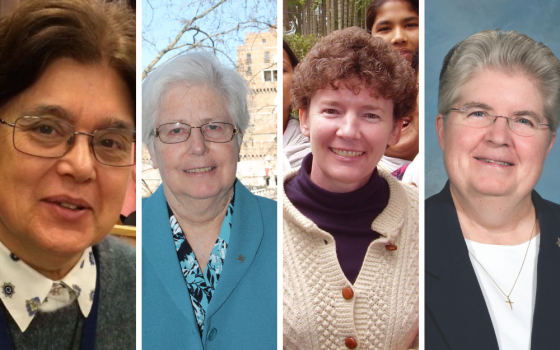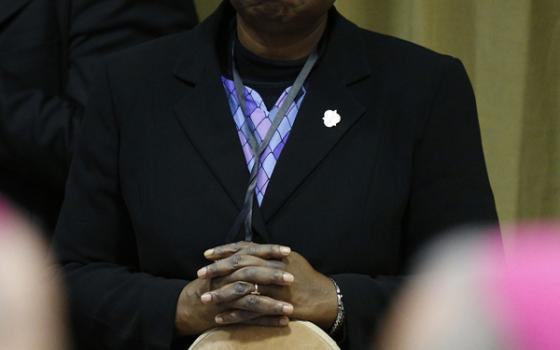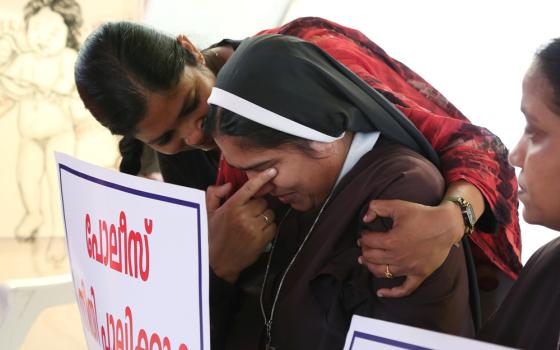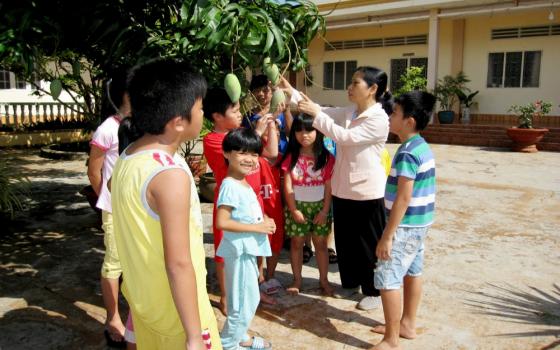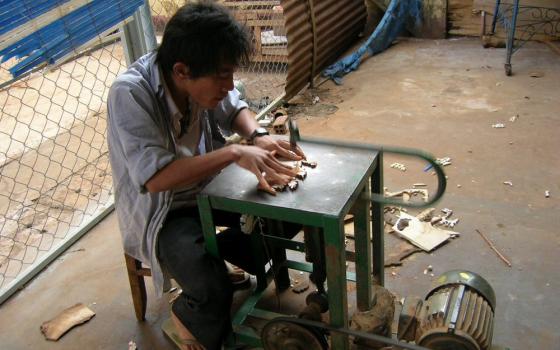Editor's note: Global Sisters Report recently held a discussion with Sr. Carmen Sammut, president of the International Union of Superiors General and superior general of the Missionary Sisters of Africa; Sr. Pat Murray, executive director of UISG and member of the Institute of the Blessed Virgin Mary; Sr. Sharlet Wagner, president of the Leadership Conference of Women Religious and a Sister of the Holy Cross; and Sr. Carol Zinn, executive director of LCWR and a Sister of St. Joseph of Philadelphia. This is an edited transcript of that discussion.
GSR: In the last few months, when the issue of sexual abuse of sisters by clergy came up, both LCWR and UISG made statements. Are there any plans in either organization to follow up on this issue? Have you been asked, either one of these organizations, by the Vatican or bishops for further input about what's happening with sisters in your realm of the world?
Wagner: For LCWR, I would say we've not been asked for further input apart from the bishops' invitation to Sr. Teresa Maya to address them at their November meeting of the USCCB. We have been taking opportunities to speak. Where they arise, we put out a few statements. We have done interviews with some national and international media and have brought up issues with dicasteries as we visit.
Sammut: At UISG, we will be speaking about this at the assembly in May. We know that local formation is needed so that the sisters are ready also to speak out in order to make sure that there are good structures that we have. After the meeting at the Vatican, we have not been asked anything yet.
Murray: We try to create the conditions so that if people need to speak, they will be helped to speak. This is a huge area because it's a huge cultural dimension. It's a bigger question than the question within the church — the whole question of the status of women within cultures. It requires a huge educational and cultural shift in every part of the world.
Zinn: The other piece from LCWR's perspective and, I think, UISG sisters', too, is that one of the things that we're trying to be faithful to is to keep the survivors in the front of the story that while a cover-up is certainly a reality, the bigger reality, really, is the pain and suffering of those who have suffered the abuse. So when you ask what are we doing and what do we hope to do in terms of Sister Veronica [Openibo]'s piece about breaking a culture of silence and secrecy, LCWR's focus has been from the beginning and continues to be first and foremost on the survivors — not victims, on the survivors. Then secondly, on the abuse of power.
In the last several months, there's been a marked increase in the number of people alleging sexual abuse by women religious. [LCWR issued a statement on this issue in February.] Why do you think these allegations are coming out now? Most of them are from at least the '70s and '80s. And what specific steps are your organizations taking or planning to take in response to these kind of pressure allegations?
Wagner: Sexual abuse in general is in the news now. That, I believe, accounts in part for the increase in the number of people coming forward with sexual abuse allegations by women religious. The #MeToo movement is in the news. I want to say that sexual abuse is a huge societal issue. It is not limited to the church, and that's not in any way to minimize the abuse that has happened in the church, abuse by priests and, as we are hearing now, by women religious.
But it is an issue that needs to be dealt with in our society, and not just the American society, but around the world. It's coming forward more because it is in the news more. It's no longer such a taboo to talk about sexual abuse, which is a good thing. So the victims feel more comfortable with coming forward and with the fact that they will be believed, whereas in the past, they may not have been believed. They may have been ostracized. There would be a lot of negative repercussions.
Zinn: To follow what Sharlet just said, I think that as we've seen in the United States, every time a state district attorney releases a report over the years, actually, not just since August in the Pennsylvania state attorney's general report, it is like a scab that's pulled off of the wound of anyone who has suffered this abuse. So I think there's some of that that is happening in terms of why this is coming out now.
I also think the piece about the secrecy, the #MeToo movement, for instance, all around the world, there's just a different air, if you will. We see it in the United States, especially, where there is more space for people to come forward.
When you asked about steps that our organization, LCWR, is doing to respond to these allegations, I know that you know that LCWR is a voluntary organization. We have no authority over our members at all. But what we have done in cooperation with the Resource Center for Religious Institutes is to make sure that we have guidelines published and made available to our members and strongly encourage — strongly, strongly encourage — that our members, our leadership teams, have in their organizations, in their institutes, the policies and procedures that are A. In place. B. Operative. C. Updated. And D. used.
We do have response from our members that we have a pretty high confidence rate that a high percentage of our members, if not all of them, have those things in place. What we do is provide the impetus, if you will, to say, "Please make sure you have these, and here are the 'these' that you should have, and we will help you be able to formulate those."
Murray: One of the things that's also helped is that in many parts of the world, in many countries, very good programs on relationships and sexuality have been developed. That has given people, particularly younger people, the language to speak about any kind of abuse or inappropriate behavior.
In terms of what UISG is doing, we have obviously a key leadership function, and that's in terms of helping and encouraging the development of codes of conduct, putting protocols in place, and also looking at the kind of formation that deals with human development and the whole area of sexuality and appropriate behaviors. So I think these have been in place for some time in many parts of the world. But just to make sure that these are known and shared and that people have mechanisms in place to accommodate religious at this time.
After the grand jury report about sexual abuse by Catholic clergy and religious from Pennsylvania came out in August, there were many people who said sisters had a unique position and a unique ability to help restore the credibility of the church. Do you believe sisters have that unique role and ability? If so, how do you do that? What specific steps can you take or things can you do in that effort?
Zinn: Religious life itself has a place of credibility within the life of the church. The very nature of it is that it is on the edges, if you will. Some writers refer to it as: "Religious life is the margin of the Gospel." Secondly, religious life by its nature is called to be not only on the edges, but with the people who are on the margins. So I think our credibility lies in the fact that we are, in fact, with the people of God.
We are with them on the streets. We are with them in counseling sessions. We are with them in ERs. We are with them where the pain is. So I think the credibility piece is a fact of life. I really do believe that the credibility crisis affecting the church is larger than a resolution, if you will, that can be done by sisters.
What I have seen already in the States and in other places in the world, but certainly in the States, we have been at tables with the laity of the church calling for addressing the credibility crisis in the church. So I think in some ways, religious life is already participating in those conversations. But I think what I would offer is the credibility because we are in fact with the people of God on the streets, and we also are laity. So I think the efforts in the United States and around the world where the laity are involved in conversations about the governance models of the church, that that's where religious belong, in those conversations with laity.
Sammut: Besides having protocols and codes of conduct, which are verified in daily living so that we can be really people who are protecting children and vulnerable adults, I think that as Carol has said, that our credibility is the way we are working with people who are on the margins, who society does not care about. It is also with those of our members who are in war zones and who remain in very difficult situations in spite of everything, those who are advocating for the Earth and for the poor.
Also, we can become more credible, I think, if we search for new ways of expressing our failures, our sinfulness, not trying to give an image of perfection, which no one can reach — neither us nor the clergy nor the laypeople. It's an appeal somehow to live our Christian life in a humble way.
Three years ago UISG raised the question at the urging of the membership of UISG to Pope Francis about the role of women deacons and was there a possibility of the role of women deacons. Do you expect that question will be answered by Pope Francis at the UISG plenary coming up in May? And what is your preferred expectations of the result?
Murray: Obviously, that question was asked three years ago. We don't know what the pope will say. I'm sure he has been reflecting on the report that has been given to him. So we have to just wait and see.
In raising that question, we were also raising the whole area of the role of women in the church, not just in an informal way, but seeking for a way of being in a structured relationship in an institutional relationship so that women, both religious women and laywomen, would be included in reflections, discussions, discernments and decision-making. So there's a wider question in there in terms of participation.
What might those structures be? Are there specifics that you could think of or could share with us that may be being discussed or that you would hope for?
Murray: I think there are structures already in place that could be used. For example, at the very synods that take place, there could be a known number of women religious participating on behalf of UISG, just as there are a known number of male religious who participate from USG.
There's also, for example, the World Union of Catholic Women's Organizations could be formally included in meetings of dicasteries. Dicasteries have regular plenary meetings. There's a way in which various organizations that are recognized within the church could be regular participants at these kinds of meetings.
Another structure, which is the structure of mixed commission meetings — meetings that take place between conferences of religious and conferences of bishops — could be given a more formalized structure within the church.
So there are lots of possibilities, but it needs to look at the whole system. I'm not recommending one rather than the other, but I am, I suppose, at a personal level saying that there's a need to look at the various levels and structures and see where things can be formalized.
Is there any movement on this? Any discussion with offices of the Vatican?
Murray: There have been conversations around these and, I'm sure, in relation to the document Mutual Relations, there have been discussions on the need to look at structures and processes. So I do believe the conversations have already begun. It takes time. The church organization is a very large organization with a multiplicity of levels, and a multiplicity of cultural context. So this is a journey of dialogue as one searches for the best way forward.
What topics and issues are most likely to surface at the UISG plenary? To go back to the abuse question, do you think there will be a new statement from the plenary on the abuse issue?
Sammut: We've already had two statements, so we don't think that we will have another statement. But we will work with our members on the two statements. The topics that are coming out for our next meeting are interculturality, the care of the Earth, and interreligious dialogue.
Are these things that have come up through the constellations? How were they chosen for the agenda?
Murray: These are topics that we've been working on because they have been emerging as felt needs within religious congregations. Particularly, if we look at the area of interculturality, obviously there's a growing diversity happening within religious life all over the world. We also feel this is a prophetic moment for religious life. We're at a time when more and more, there's division, and there are divisions growing for all sorts of reasons.
People feel separated from one another rather than being part of one another. We really believe that the prophetic role of religious life is to be a bridge between peoples of different cultures, but also different faiths, or people of no faith. This has always been the culture of religious, to be that presence with the other, no matter who the other is, to reach across. We've all learned that just because we come together from different cultures and live in the same community or work together in the same mission and ministry doesn't mean that we actually understand the dynamic of culture.
Here at UISG in the month of January, we had 45 teams from 45 different religious congregations. That was 180 people attending a two-week seminar where, in a sense, we began the journey of understanding cultural differences and learning about intercultural communication. It was also learning about the spirituality and the theology behind living in this way, a sign and symbol, really, of the reign of God and of the future of humankind.
This was a very profound experience for those who participated. Our idea was in training these 45 teams — and we will continue to do that over the next two years and follow through on the people who attended in February — we see them as multipliers with the role inside religious life, but also in their various communities. Every continent was represented. I think we named something like 72 countries.
We're looking at becoming, if you like, a leaven in society, seeing how religious life can be that leaven, to help carry people across one to the other and really build a new humanity, which is the call of the Gospel. So that's something that's been growing within UISG, as has the care of the Earth. We're listening to Laudato Si', the call of Pope Francis recognizing the abuse of the Earth and also the abuse of people in terms of how people are seen as easily discarded. The poor are those who suffer when the Earth is damaged.
We have a new campaign for the last 18 months here at UISG calling on sisters and people of goodwill who work with us to join in this campaign of hope for the planet. Again, this will be an important part of the focus of our plenary. A new edge for us at UISG is the whole area of interreligious dialogue, but doing it in the dialogue of life. In other words, seeing where we can work together with other faiths.
We're very excited about a new project that we call Wells of Hope. It's a project centered on the Mediterranean basin, where Catholic sisters and Muslim women are beginning to work together against human trafficking.
We at UISG see these very practical projects as a sign and symbol to our members worldwide, that they might respond in their own context to do something similar. That's one of the focuses of a plenary assembly, to give leadership a model at an international level so that that same leadership can be actualized at the more local level.
Back to Mutual Relations. Is there any idea yet on the timing? But more importantly, you had said before you had input on the document. Is that input continuing?
Wagner: We don't know what the status of the document is. We are eagerly awaiting its release. We see it as an opportunity when it is released and an impetus for dialogue with the bishops as we together break open the document. But we know it is in process. LCWR did provide input early on with the document. We gathered input from our member congregations. We have not provided additional input.
What about UISG?
Sammut: We know that the dialogue is ongoing. We continue to work with the two dicasteries, in fact, with the Congregation for Institutes of Consecrated Life and Societies of Apostolic Life and the Congregation for Bishops, because the two congregations are working together in order to finish the document from all that was given through all the work that has been done during the past two or three years. So it is a work in process.
I have appreciated greatly the fact that over the last two to three years, there's been an ongoing dialogue, which began at grassroots level involving conferences of religious, and then developing a synthesis of all the feedback that was sent to the congregation for religious, and that's been sent to the writers of the document. I believe that the writing team, which is made up by representatives from the Congregation for Bishops and the congregation for religious life, but most of the members are religious themselves.
Murray: They're all bishops, but they're also religious. And there are religious women who are involved in writing the document, as well. So there's a good input by religious men and women into the writing of the document, which is greatly appreciated.
Sometimes sisters find it difficult to articulate their spirituality or their theology. They live it, but the articulation is challenging. Is there any way that at some stage, UISG could sponsor a convening of theologians of the developing world who have master's degrees and doctorates to teach how to do this articulation?
Murray: In a way, we're already on the road to try to respond to that. Thanks to the grant from the Conrad N. Hilton Foundation [which also funds Global Sisters Report], we plan in two years' time to have a conference of young sister theologians from the global south.
The idea would be that we would identify sisters who have a master's degree in theology, but that we would accompany them in a writing project on religious life today from their lived perspective and their context, and they would write in their own language, and we would bring these women religious speaking a multiplicity of languages. We would bring them here to UISG, and they would share their own theological papers with one another to make a richer dialogue. Out of that would come not only a publication, but also some sort of video conferencing conversations, and also some presentations by them in their different languages about their reflections on religious life.
We see it as very important to raise up this voice from different parts of the world so we're not just getting one cultural perspective of religious life today, that we're looking at the challenges. Meeting systems are different within different cultural contexts, and it's to explore that because I think it will make the gift of religious life to the church even richer.
We are aware of the fact that many sisters all over the world are looking to the U.N.'s sustainable development goals as potential frameworks for their ministries and how they interact with society. Are UISG and LCWR considering using the sustainable development goals as a framework for discussion?
Murray: Recently, I participated in a three-day Vatican summit with members of different religions from all over the world, and the theme was the role of religions and the sustainable development goals. My answer to that is religious women know that what they are doing fits into the sustainable development goals; however, we also have another language. We need to keep our language of charism, our language of Catholic social teaching and our language of our spirituality aligned.
We see the SDGs, but there's a bigger reality we bring from these three other dimensions that I've named. So it actually puts flesh on the SDGs. Whereas yes, we acknowledge them, yes the sisters are aware of them when we're dealing with trafficking and migration. We know where they fit within the SDGs, but I think the bigger vision and purpose comes from our charism and also really from our Scripture and Vatican roots. So there's a theological, biblical foundation, which I think is the added plus to the SDGs. I think that's what we as religious can bring.
Zinn: I actually was privileged to be 13 years at the U.N. when the millennium development goals were congregated. At that time, it was pretty clear that religious life, again, by its very nature, is on the margins of society. So the women religious and our brothers also around the world have been working on the millennium development goals since their founders founded them 300, 400, 800, 1,200 years ago.
We were very, very cautious about jumping on the bandwagon of the MDGs as if it were the best thing since sliced bread, and how women religious have something to contribute to it. That being said, we were also very supportive of moving forward the MDG agenda. Now fast-forward to another set of 15 years to the SDGs and, quite honestly, we feel the same way. As Pat just said so well, the SDG agenda is the Gospel agenda, and why we do the work is what the story is, not the work.
We just want to be honest, to say, "Yes, the SDGs are fabulous, and if they didn't exist, the work that women religious are doing would still be the same." So just a word of caution about not making more of the work of women religious as it connects to the SDGs, but making more of the life of women religious as it responds to the needs of the most vulnerable and marginalized and not tie it so much to a global agenda.
LCWR has taken a leadership role in drawing attention to the need for sisters to help minister at the border. We have a two-part question: First, what has been the result of that emphasis? And what do you see as the social justice issues most U.S. congregations are focused on?
Zinn: Certainly, as you know, there are women religious and men religious and lots of other groups all along the southern border. Being attentive to the needs at the border is not new for us. However, when the political situation in our country shifted the way it did several months ago, Catholic Charities actually called us at LCWR to see if we might be able to share some information that was not in the news from the people that are actually on the ground and know what's going on. So we did, and since that time, which was last fall, we've been providing our members with some updated information about real situations, real needs and real contact information where their members can email or phone if they are able to go and help out. We feel that we have made a link between the organizations that know what's going on there and what the real needs are.
I don't know about a result. That's a bit of a practical word, but I would say that the response of our members has just been absolutely phenomenal in terms of resources of time, personnel, funding, and they just keep sending sisters two and three at a time, for two and three and four weeks.
In terms of the social justice issues most U.S. congregations are focused on at the national level, I'm sure you're aware that LCWR discerns a resolution each year at the assembly. The topics come from our members. It's discerned across the country during the region meetings during the year and then it's affirmed at the assembly. Those issues are mostly across the board of environment, the whole poverty agenda, and the human rights agenda, women and education and things like that, then of course the migration and trafficking issue, and racism. What we've tried to do over the past couple of years for LCWR is to identify one or two or three focus areas. At the same time, at the local level, our members are focused on what the local issues are.
What we believe the real work of justice is is to see that absolutely everything is connected and to help people to develop that kind of consciousness. Once you see that everything is connected by way of lack of justice, then whatever you do, where your feet are makes a contribution to the local situation. LCWR's position is to try to hold that larger consciousness level.
